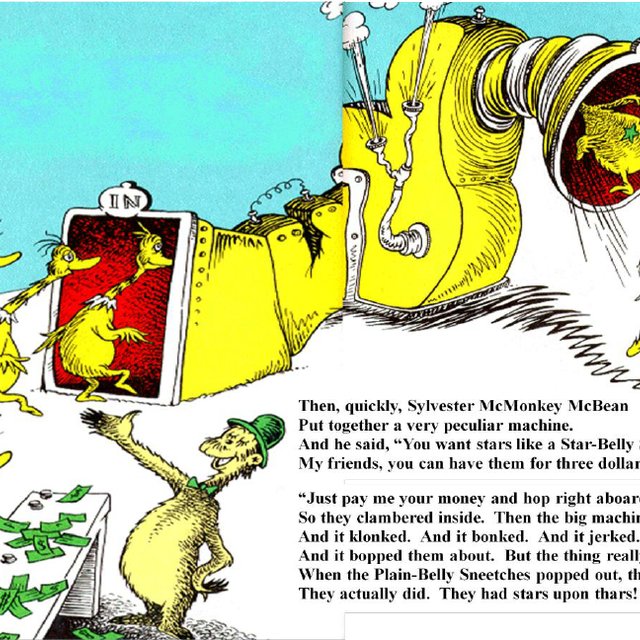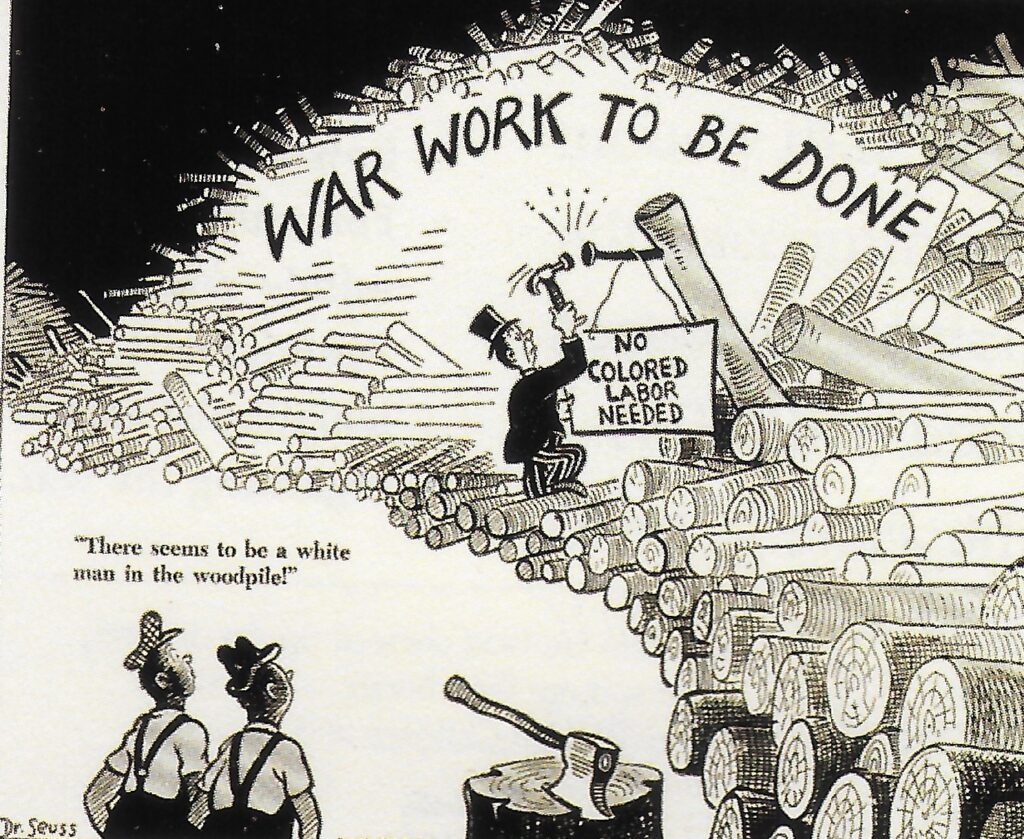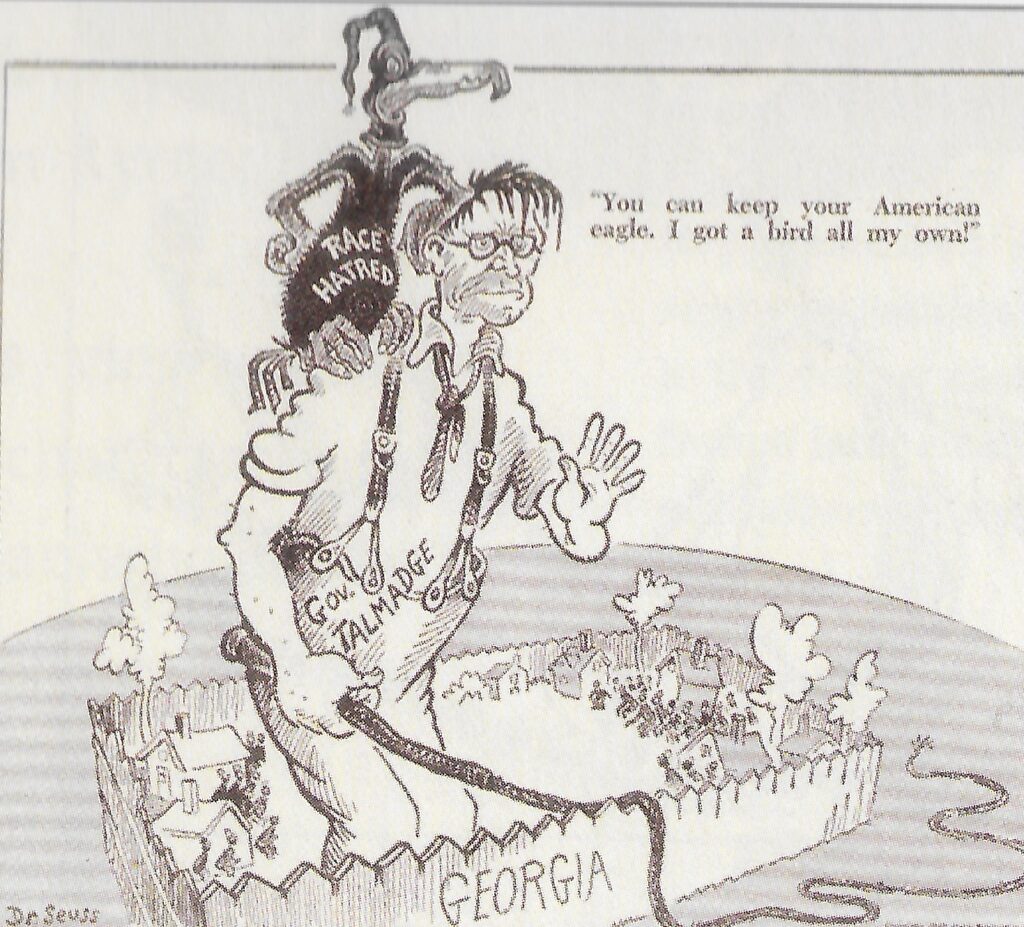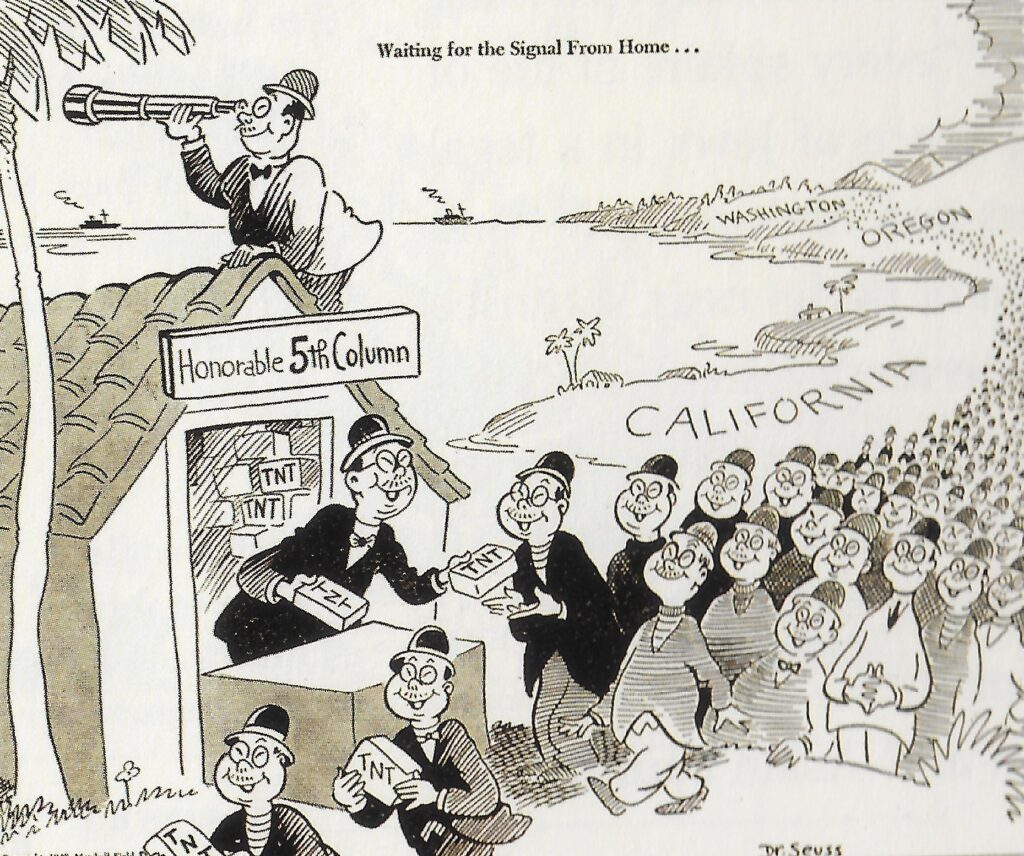Understanding Dr. Seuss — and why his books were cancelled
I have been in love with Dr. Seuss since childhood, and happily raised my own children on his lyrical work. Much of his imagery is delightful because it is so exaggerated; some of it is racist. If you want to understand why the company that manages his content has ceased to publish some of his books, you need that context.
Much of what I will share today comes from The Seuss, the Whole Seuss, and Nothing But the Seuss: A Visual Biography of Theodor Seuss Geisel, by Charles D. Cohen. As a Seuss fan, I purchased this book years ago and have vastly enjoyed it since it includes many images beyond the ones that appear in his children’s books, including student drawings, advertising illustrations, and political cartoons. If you want to know more about Ted Geisel, the man behind Dr. Seuss, that book is the place to start.
Was Ted Geisel racist? Definitely.
Geisel was immersed in his times. He published drawings in the 1920s and 30s that were highly offensive. (I will not publish these caricatures on my blog, but you can see some of them here.) They start with jokes about how stingy Scots are, and continue with big-nosed Jews and squinty and slanty-eyed Chinamen. An illustration of two imagined boxers — “Highball Thomson wins from Kid Sambo by a shade” — is impossible to view without perceiving the boxers as gorilla-like. He published illustrations making fun of slave auctions with extremely offensive drawings of big-lipped Africans, some of which include the n-word. You cannot see or read these images without being offended.
As Cohen writes:
Ted’s eventual break with the routine use of stereotypes in his work might be underappreciated without a careful examination of the humor at the expense of African and American blacks during his youth. The greatest challenge to overcome was the widespread acceptance of jokes about this group.
The Seuss, the Whole Seuss, and Nothing But the Seuss, p. 208
There is no question that Geisel was immersed in a racist culture and that the racism of the times emerged in his drawings. His talent, as all of his readers know, comes from drawing comically exaggerated caricatures of humans and creatures. When this is a furry animal, it’s delightful. When it’s a Jew, an Arab, a Chinese person, or a Black man, it’s horrifying. While it may not have been driven by hate, it embodied the racist attitudes of the time in a way that now seems outrageous.
Geisel made amends in the war years

It may be hard to reconcile these past attitudes with what we know of Dr. Seuss now — as a champion of environmentalism and wonder. And anyone who has read The Sneetches knows that it is a powerful, vivid allegory about the stupidity of prejudice.
And it’s not just the books. During World War II, Seuss published political cartoons ridiculing anti-semitic and racist attitudes of politicians including Georgia’s Governor Talmadge, along with cartoons publicizing the government’s unwillingness to tap Black labor in the war effort. They are a step in the right direction. But they are still problematic — the first cartoon below references a figure of speech that uses the n-word.


And the anti-Asian racism remained, including a political cartoon of a grinning Japanese horde plotting to overthrow the government. This again reflected the racist attitudes of the war years.

Is it time to cancel Dr. Seuss?
No, it’s not. Dr. Seuss has made a major and mostly positive impact on our culture. Like many artists, his past is flawed. We need to acknowledge those flaws and their context to understand him as whole human being. It is still possible to read his books to children, even knowing this past, and share their positive message.
Of course, some of the books themselves also include racist caricatures. And it is within the power of Dr. Seuss Enterprises, the organization that controls the rights associated with those books, to determine what do about that. Here is the statement from their web site.
Statement from Dr. Seuss Enterprises
Today, on Dr. Seuss’s Birthday, Dr. Seuss Enterprises celebrates reading and also our mission of supporting all children and families with messages of hope, inspiration, inclusion, and friendship.
We are committed to action. To that end, Dr. Seuss Enterprises, working with a panel of experts, including educators, reviewed our catalog of titles and made the decision last year to cease publication and licensing of the following titles: And to Think That I Saw It on Mulberry Street, If I Ran the Zoo, McElligot’s Pool, On Beyond Zebra!, Scrambled Eggs Super!, and The Cat’s Quizzer. These books portray people in ways that are hurtful and wrong.
Ceasing sales of these books is only part of our commitment and our broader plan to ensure Dr. Seuss Enterprises’s catalog represents and supports all communities and families.
I loved some of those books, especially On Beyond Zebra! and If I Ran the Zoo. But if I were reading one to a child now, I’d certainly be chagrined to see exaggerated caricatures of Black people, Arabs, and Asian people grinning and strutting around the pages. I wasn’t sensitive enough to those images before — I certainly am now.
I think Dr. Seuss Enterprises took the right action. They didn’t cancel all the books, just the problematic ones. You can still find used copies of the ones they’ve stopped printing. And if you choose to do so, you can stop reading Dr. Seuss, although I’d find that an overreaction.
I’m not comfortable with Dr. Seuss’ heirs continuing to spread exaggerated racial caricatures, so I think they did the right thing.
You point out an opportunity to discuss the artist as a whole person. I agree. I love much of Hemingway’s writings but he also held prejudices that offend me. Years ago, when I read Huck Finn to my son, I skipped the N word, just couldn’t say it aloud. I wonder how we can have meaningful discussions about this in today’s cultural and media environments.
If it please counsel, I object to the word “cancel.” It is such a political term now– it feeds a right wing meme that isn’t quite accurate. The Dr. Seuss organization made a moral decision to move on from these books, rather than continue to make money off the books’ racist tropes.
I like it! I like it! I like it! I do! And wonder why others don’t think more like you? Thank you for giving an even accounting of Mr. Geisel’s evolution of thought and practice. I didn’t know any of this history and wasn’t even aware of the titles in question—we were of the Green eggs and ham, Sam I am party. But I applaud his family for their honest evaluation of the material and a compassionate response. What I see here is a man who was able to change his point of view and was unafraid to make sure others knew that he did. Another good lesson we can all learn from Dr. Seuss!
I can’t wait until Uncle Remus and Brer Rabbit and Brer Fox get canceled…NOT.
Now, what about Tin Tin…
https://www.counterpunch.org/2012/02/15/tintin-and-racism/?fbclid=IwAR0t1aEVxF0wZcpp6MSPXUmrQfAiInCgfZgSF8mETY6aaEWtQ-YPB5wTVsQ
Talk about bullshit. People taking themselves so seriously that any hint of a differing opinion greatly offends them is the bullshit being forced on everyone.
Whether one agrees such words and images are still racist, even out of context, because it once was, or not, cancelling history does not magically make it go away. Ignorance is another word for idiocy.
ran across this just after reading the above article yesterday
. . . . and thought there will be someone out there who finds everything everyone says and does to be racist.
I don’t know if you’re a Medium follower or not, but they have attracted the most incredible nation of racist writers on the planet — and they’re all celebrated as “accomplished” writers, thinkers and authoritarians on the subject of “racism”! What kills me is how easy it is to blame history. Like people are now celebrating the Japanese for attacking Pearl Harbor, because we were anti-asian racists! Some of us had relatives and loved ones killed by the Japanese attack on Pearl Harbor, but we cannot blame the Japanese because then we would be racists! So, they attack Dr. Suess because he drew political cartoons during the war where the Japanese were trying to kill us! Most intelligent people will find that ludicrous.
Like the guy who wrote that traffic signals are racist — this guy has like a hundred thousand followers. And this woman who has defined “racism” a hundred different times, each one different, and has like a million readers! In fact, Josh, you should be parallel publishing on Medium, you’d be very, very popular. You’d have millions of readers!
Who knew there was so much racism until these folks came along. Oh, it’s much much much worse than COVID… and it’s a darn good thing racism doesn’t kill the victim or we would ALL be dead.
And it’s all based on a false narrative anyway!
. . . thought this might amuse . . .
Alas they’ve come for Dr. SEUSS,
they wish to hang him with a noose.
They claim his tales were racist bent,
they judged him fast, missed what he meant.
But if we look inside his tales,
you’ll find the balance of the scales.
Remember when Horton heard a Who,
and we heard the wisdom of the Lorax too.
The lesson behind Green Eggs and Ham,
that changed the mind of Sam I am.
Remember too the rotten Grinch,
who once would never give an inch.
He taught us lessons, one and all,
boys and girls, big and small.
So if you’ve judged his works as poor,
you should re-read them, I implore.
The man we know as Dr. SEUSS,
turned our imaginations loose.
His impact was beyond compare,
he taught us it was good to care.
To accept the red, the blue, the green,
and on each other we can lean.
So if you still won’t give an inch,
your heart has hardened like the Grinch.
Release the grudge, the hate, the rue,
and embrace the hope of Cindy Lou!”
I love that poem, my sentiments exactly! I grew up with Dr. Seuss and so did my kids.
Never, ever thought about racism, only how fun and silly those books were! And what a
great way to learn and teach kids to read. I was so disappointed when Little Black Sambo went away, my brother and loved that story, it captured our imaginations. I used to think how it would be to visit a far away country where
little boys could outsmart wild tigers! And to think I saw it on Mulberry Street, one of my favorites, I thought
it was about a boy who was daydreaming on his way home from school! OMG! My favorite ride at Disneyland
It’s a small world! Please, NO God!! I also remember the Frito Bandito, he was funny and we never thought anything about it except it was a commercial we liked. Books and the authors should be appreciated and respected for the time that they were written. People can’t erases history, if you don’t approve or disagree then just
don’t buy it! I’m against racism, but don’t take away the rights of others to make their own decisions about the reading material they choose to enjoy.